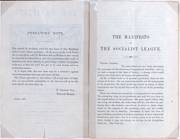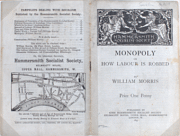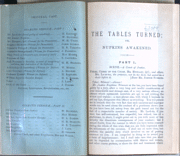

Eminent as poet, novelist, translator, artist, and printer, William Morris also gained a place in the history of socialism. His boyhood wanderings in Epping Forest solidified the intense romantic in his nature, and it was, therefore, not a long step to harboring utopian dreams of a just and happy society:
Although this vision prevailed during the years when Morris gained his reputation as poet and designer, it was not until 1883 that his conviction of the industrial revolution’s dehumanization of mankind brought him to socialism. Morris joined the Democratic Federation, a league of London workingmen’s radical clubs, and when this was disrupted by factional strife the next year, became a leader of the new Socialist League, financing such projects as their journal, The Commonweal, and exhorting groups of laborers to fight for a new society. In September 1885 in a turbulent courtroom where demonstrators were being severely sentenced to hard labor, Morris was charged with creating a disturbance and assaulting a constable; his denials under questioning were accepted by the otherwise harsh judge. When haranguing a street-corner gathering in July 1886, Morris was arrested by a vigilant policeman but discharged without trial. Unquestionably these incidents, which were reported internationally, embarrassed the judiciary and gained sympathy for the socialist cause. On “Bloody Sunday,” the Trafalgar Square Riot of 1887, in which police attacked a crowd insisting on the right to free speech, Morris spoke from a cart but escaped the truncheons that killed three and injured more than two hundred. This forceful, though merely fractional, use of state power convinced Morris that a socialist revolution was not possible in his time and that the chief task before him was education. His tracts and pamphlets employed both prose and poetry.

E. Belfort Bax and William Morris. “The Manifesto of the Socialist League.” London: Socialist League, 1885.
One of Morris’s first tasks in the Democratic Federation was to write a declaration of principles which was published in 1883 as a manifesto, “Socialism Made Plain.” The text was not adequate, however, for the more mature thinking of the group that broke away from the Federation in late 1884. When Morris and several others established the Socialist League, they rewrote the manifesto. One of the leading intellectuals in the organization was Ernest Belfort Bax, described as a “hard-shell Marxist economist.” Together he and Morris wrote the new “Manifesto,” co-edited The Commonweal, and worked jointly on a series of articles, “Socialism from the Root Up,” later published as Socialism: Its Growth and Outcome (1893).
 William Morris. “Monopoly or How Labour is Robbed.” Hammersmith: Hammersmith Socialist Society, 1893.
William Morris. “Monopoly or How Labour is Robbed.” Hammersmith: Hammersmith Socialist Society, 1893.
The Hammersmith Branch of the Democratic Federation was formed at Kelmscott House on June 14, 1884. There were ten founding members, all of whom contributed to establishing a group not entirely divergent in theory from other branches, but yet quite distinct in character. Artistic and literary influences were more apparent; occasionally the branch rejected Federation policy.
It maintained its singular characteristics even after it became a branch of the Socialist League. It met in the Coach House, originally a stables that was converted to a workroom for Morris & Co. Subjects of the lectures were more varied than most, and members of the audiences sometimes included Oscar Wilde, H. G. Wells, W. B. Yeats, and even a very young Gustav Holst.
During the late 1880s, a growing number of Socialist League members began to associate themselves more closely either with anarchism or the old Federation. After much in-fighting, the Hammersmith Branch finally severed its connection and in November of 1890 the Hammersmith Socialist Society was formed. The Society published many of Morris’s earlier lectures. He first delivered this one during the winter of 1887, a time when he was devoting much of his energy to speaking engagements throughout the greater London area.
 William Morris. “The Tables Turned; or Nupkins Awakened.” London: Office of The Commonweal, 1887.
William Morris. “The Tables Turned; or Nupkins Awakened.” London: Office of The Commonweal, 1887.
In order to raise funds for The Commonweal, Morris wrote his only play, this political mini-farce. First performed on November 15, 1887, it included Morris himself in the role of the Archbishop of Canterbury. The plot concerns the trial of a socialist accused of sedition and incitement to riot and murder. The prejudiced judge, Mr. Justice Nupkin, finds that by the end of the trial, he, and not the defendant, is the one sentenced to the farmer’s life, forced to renounce his city ways and spend his time digging in the fields.
The play was such a success that it was performed at least ten times during the winter of 1887/88. It received one professional review written by William Archer, drama critic for The Pall Mall Gazette.
| INTRODUCTION | BIOGRAPHY | WRITINGS | KELMSCOTT |